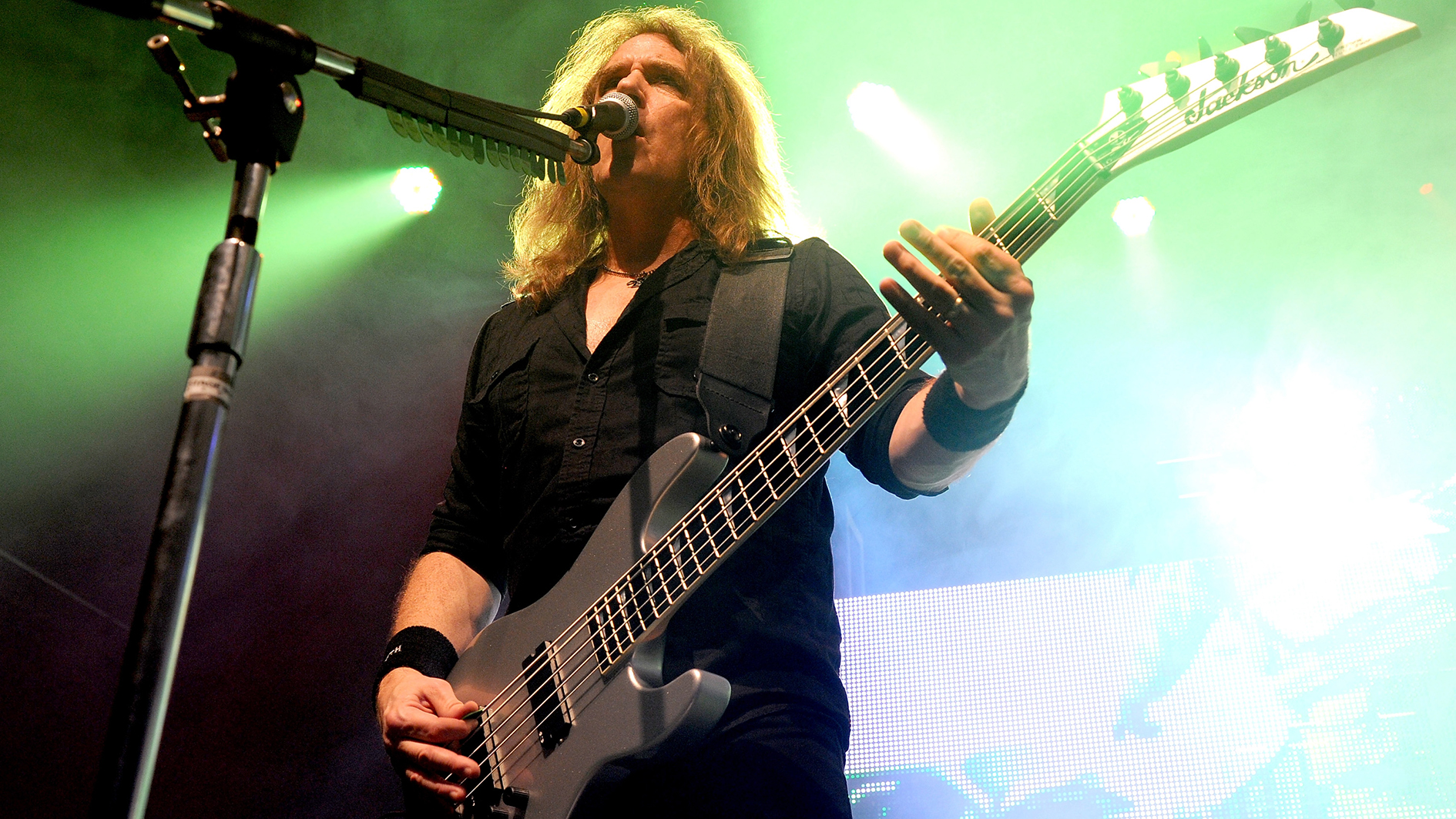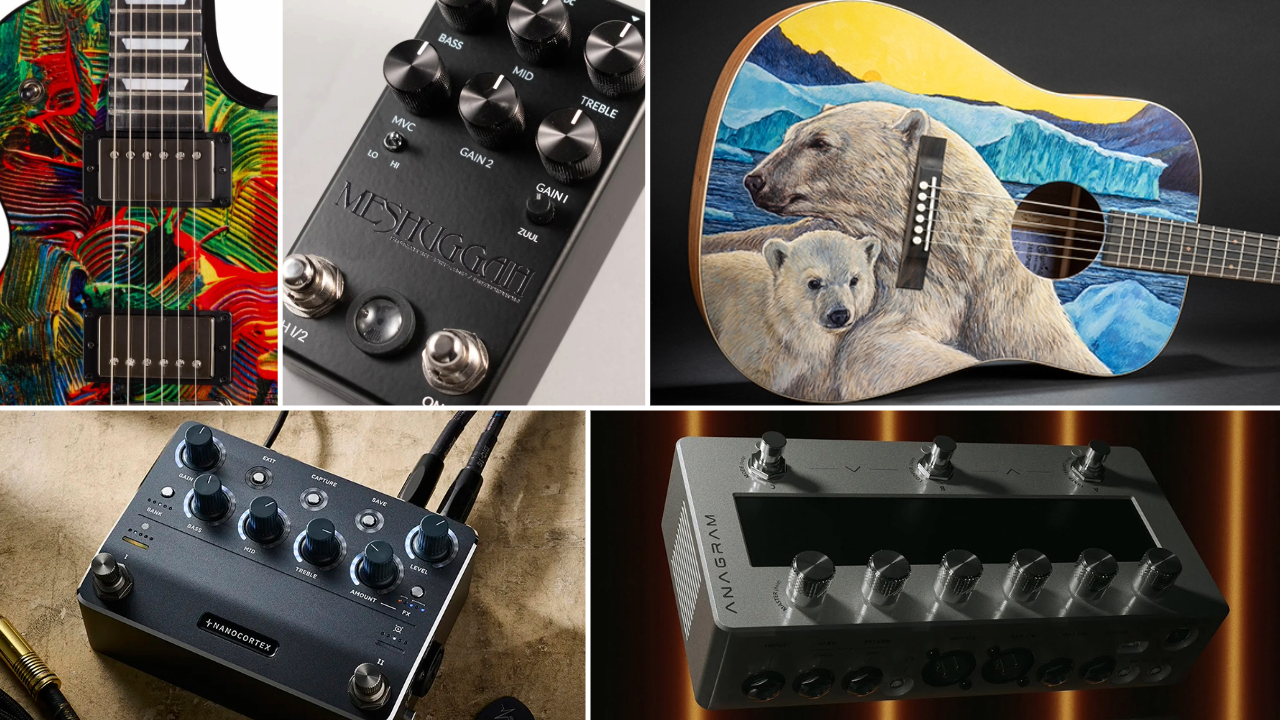Megadeth's Dave Ellefson: "With bass design, sometimes the best way forward is to go back in time"
The thrash-metal bassist is not one to sit still between the band's touring cycles. Here he talks solo ventures, spoken word and collaborating with Jackson

Megadeth, a recording and touring metal band that has operated at the very top of its niche since 1984, was put on hold early in 2019 when frontman Dave Mustaine embarked on treatment for throat cancer.
Fortunately for the band’s huge numbers of fans, he’s due to resume touring again this year, but during Megadeth’s hiatus, bassist David Ellefson - a musician who runs several other businesses outside the band under the EMP banner (Ellefson Music Productions) - has used the time off in many creative ways.
The most prominent of these has been a raft of international tour dates as a solo artist, some under his Basstory spoken-word format, others with his solo band and still others one-offs such as a recent show in the English city of Wolverhampton, alongside former Judas Priest guitarist KK Downing.
“That was really something, man. The place was packed!” says Ellefson. “You know, it all comes together. I released a solo album called Sleeping Giants last year to accompany my new book, More Life With Deth. Originally we were going to record a single song for download, but as the project evolved we decided to do a full album. It’s the perfect title because some of the songs had been in the vault for years.”
EMP has expanded its operations with great rapidity over the last couple of years, including a record label, a booking agency and a film production company which has a horror film called Dwellers coming out next year. There’s even a signature Ellefson coffee brand. How does he make it all happen, we ask?
“Essentially I was able to put out the solo album and the new book on the back of the Basstory brand that we created last year - and it’s been wonderful to see all these things come to fruition. I’m glad Thom [Hazaert, co-writer] pushed me to write the second book, because so much has happened since I wrote the first one [My Life With Deth, written with this magazine’s Editor in 2013]. The audiobook is out now.”
My goal has always been to invent and develop very high-octane, cutting-edge instruments
Of course, let’s not forget the small matter of Ellefson’s signature Jackson basses. US-made and import models have been available since he rejoined Megadeth in 2011, after an eight-year period away from the band as an artist rep for Peavey, as well as the Kelly Bird model which he designed. Last year Jackson announced two more Ellefson basses, the X Series CBXM four- and five-string models.
Get The Pick Newsletter
All the latest guitar news, interviews, lessons, reviews, deals and more, direct to your inbox!
“They released these basses at Summer NAMM and they’ve been selling gangbusters,” he explains. “The Fender sales staff do an annual vote of Best In Class for the year, and my bass was top of all the new products, across the board. The idea came from Mike Tempesta, who is their artist relations guy. We were at Bass Player Live! in around 2012, and we’d done the 20th anniversary basses the previous year - and we started talking about how we could take the concept further.”
If you’re familiar with the previous Ellefson signature bass, you’ll know that it’s a dragster of a bass, with Jackson’s trademark spear-shaped headstock, active electronics and a shreddy neck. The instrument couldn’t be more heavy metal if it tried, but that aesthetic is not for everyone, of course, hence the more traditional look of the new X Series basses.
“My goal has always been to invent and develop very high-octane, cutting-edge instruments,” he explains. “I prefer basses that look like they move fast and move forward. With that said, while trying to bring the brand ahead, there’s something to be said for going back to the classics.
"As with Megadeth, and indeed with the entire concert business, sometimes the best way forward is to go back in time, and to create a classic, traditional instrument that still has all the usual Jackson-isms.”
This is a bass that you can play at a Megadeth show, or in a country band, or in church
He adds: “This is a bass that you can play at a Megadeth show, or in a country band, or in church, and maybe even in a jazz band: somehow it works in all those environments. As you go down the neck there’s a brightness and an attack from the maple fingerboard that comes across, and I went back in time with the P/J setup.
"The very first Jackson basses that I got from Grover Jackson back in the day had that configuration, because I noticed that if you flipped the P pickup to the reverse position, with the lower magnet towards the neck than towards the bridge, it got rid of an annoying low-mid frequency that just doesn’t work in a metal setting, because it gets the bass right down inside the kick drum.”
The rest of Ellefson’s gear is tried and tested - Hartke heads and cabs, SIT strings and a GruvGear strap – which is probably just as well, given how much extra stuff the man has going on.
As he concludes: “The theme of my new book is really to say yes and get on board with things as they come along, and I’m glad that I did, because when a space opened up in my calendar I had several things that could come along and allow me to do what has essentially been a solo world tour. There’s a lesson, right there.”
Bass Player is the world’s most comprehensive, trusted and insightful bass publication for passionate bassists and active musicians of all ages. Whatever your ability, BP has the interviews, reviews and lessons that will make you a better bass player. We go behind the scenes with bass manufacturers, ask a stellar crew of bass players for their advice, and bring you insights into pretty much every style of bass playing that exists, from reggae to jazz to metal and beyond. The gear we review ranges from the affordable to the upmarket and we maximise the opportunity to evolve our playing with the best teachers on the planet.
“I was playing stuff I don’t think James Brown understood. He told me, ‘You have to play the one – you’re playing too much’”: Six years after he quit touring, Bootsy Collins reflects on James Brown and George Clinton, and what he gets out of playing today
“When I first heard his voice in my headphones, there was that moment of, ‘My God! I’m recording with David Bowie!’” Bassist Tim Lefebvre on the making of David Bowie's Lazarus








![[from left] George Harrison with his Gretsch Country Gentleman, Norman Harris of Norman's Rare Guitars holds a gold-top Les Paul, John Fogerty with his legendary 1969 Rickenbacker](https://cdn.mos.cms.futurecdn.net/TuH3nuhn9etqjdn5sy4ntW.jpg)


